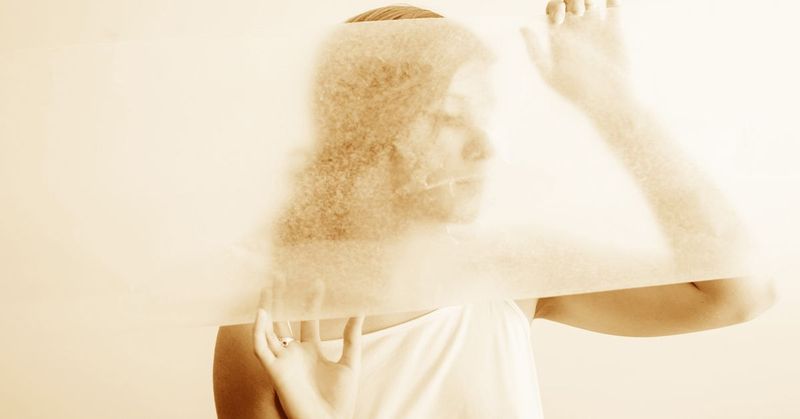22 Quiet Signs Of A Woman Who Has Been Misunderstood Her Whole Life, According To Research
A woman can go through life being kind, capable, and thoughtful—and still feel like no one really sees her. Not because she’s hiding, but because the world often misreads quiet strength, emotional depth, or careful words.
Being misunderstood isn’t always dramatic. Sometimes, it’s in the way she softens her voice to avoid conflict, or how she second-guesses herself after being dismissed too many times. These small, overlooked moments build up over the years.
This post shines a light on those subtle signs—the ones that say more than they’re given credit for. It’s not about fixing or labeling. It’s about noticing, and maybe helping someone feel just a little more seen.
1. She Constantly Second-Guesses Herself

Have you ever found yourself rereading a text message ten times before hitting send? It’s as if every word needs perfect alignment or it might morph into something unintended. A woman misunderstood often questions even her most reasonable decisions.
She’ll wonder if she’s too forward, too reserved, or just “too” something. This constant second-guessing doesn’t stem from indecisiveness but from years of being misjudged. She apologizes for things that aren’t even her fault, like bumping into someone who wasn’t watching their step.
Internalized doubt becomes a shadow, whispering uncertainty in her ear. You see, this isn’t about lacking confidence; it’s about a lifetime of trying to read the room perfectly. If you’ve ever experienced this, you’re not alone. It’s a quiet battle against a world that seldom pauses to understand the real you.
2. She’s Often Labeled as “Too Sensitive”

From the sandbox to the boardroom, being labeled “too sensitive” can feel like an unshakable badge. It’s not that she cries at the drop of a hat; it’s more about feeling deeply in a world that rewards numbness. People often see this sensitivity as a flaw rather than an asset.
When she was young, maybe she expressed her emotions openly, only to be told to “toughen up.” Fast forward to today, and you might find her carefully guarding her heart. This label isn’t just about being emotional; it’s about navigating life with empathy.
Sensitivity often feels more like a judgment than an understanding. Being emotionally in tune is a gift, but when misunderstood, it can lead to a lonely path. It’s not that she wants to change; she just wishes others could see the strength in her sensitivity.
3. She Prefers Writing Over Speaking

Imagine preferring texts and emails to face-to-face chats. For some women, writing offers clarity where spoken words falter. It’s not about avoiding conversation; it’s about finding the right words without the pressure of immediate response.
Writing becomes a sanctuary—a place where she controls her message, avoiding the misinterpretations often experienced in verbal exchanges. Growing up misunderstood, she’s learned that people read her words more than her tone.
When she writes, she finds freedom in expressing feelings precisely, without the fear of interruption or dismissal. This preference isn’t about hiding; it’s about presenting her thoughts authentically. She’s not avoiding you; she’s just ensuring her message reaches you as intended, without the noise of assumptions and interruptions.
4. She Feels Emotionally Exhausted After Socializing

Ever felt like you need a nap after a party? Social settings can be emotionally draining, not because she’s antisocial, but due to the constant monitoring. She’s often on high alert, ensuring she doesn’t say something that could be misconstrued.
The emotional exhaustion isn’t about the people; it’s about the energy spent in maintaining a facade of being perfectly understood. After gatherings, she needs time to recharge, like a phone running low on battery. Sitting quietly at home, she relishes the solitude, allowing her mind to rest after the chaos of interpreting countless signals.
Her retreat into silence isn’t about rejection of others; it’s a retreat into herself, a space where she can breathe without the pressure of external judgment. This time alone is essential for her well-being.
5. She Struggles to Accept Compliments

Ever received a compliment that felt more confusing than flattering? Compliments can feel like riddles to a woman often misread. When someone praises her, she might deflect or question its sincerity. Is it genuine or a polite formality? Years of mixed messages make praise feel like a double-edged sword.
She wonders if accepting it makes her seem arrogant or if rejecting it appears ungrateful. Instead of simply enjoying the moment, she overthinks it, searching for hidden meanings.
This struggle isn’t about not appreciating kindness; it’s about navigating a world where messages have often been misunderstood. Compliments, rather than boosting her, become puzzles she must solve, a reflection of her journey through misinterpretation.
6. She’s Called “Intense” for Having Deep Thoughts

Have you ever been told you’re “too intense” for pondering life’s mysteries? For some, deep thoughts are a natural part of existence. Yet, this introspective nature is often seen as “too much.” She craves meaningful conversations but finds herself pushing those desires aside to fit in.
This label can feel limiting, forcing her to hide parts of her that yearn for depth. She doesn’t want to be the party’s life; she seeks genuine connections that resonate with her core. Her intensity isn’t about overwhelming others; it’s about exploring the richness of life.
Yet, the world often mistakes this for being overbearing. It’s not an attempt to dominate—it’s a yearning for understanding and connection on a profound level.
7. She Downplays Her Accomplishments

Ever met someone who shrugs off their wins as if they’re no big deal? A woman who’s been misunderstood might downplay her successes to avoid being misread as boastful. She doesn’t want to appear arrogant, so she minimizes her achievements in conversations.
It’s not about lacking pride in her work; it’s about steering clear of potential misjudgments. The habit of underplaying accomplishments stems from a fear of being perceived as seeking attention. She wants her work to speak for itself, without her having to shout about it.
This isn’t self-doubt; it’s a strategy to maintain authenticity in a world quick to judge. Her humility isn’t about denying her worth—it’s about quietly standing firm in it.
8. She Apologizes More Than Necessary

Ever found yourself saying “sorry” for things that weren’t even your fault? For many women, apologies come as naturally as breathing. It’s a reflex, not necessarily about taking blame, but about smoothing over potential friction. This tendency grows from a desire to avoid conflict, even at the cost of her comfort.
She apologizes for speaking up, for staying quiet, for just existing sometimes. This habit masks a deeper need—the longing to feel safe being herself. It’s a learned behavior, born from environments where her true intentions were often questioned.
If you’ve ever experienced this, know that those apologies aren’t about weakness; they’re about navigating a world where her presence sometimes feels like an imposition.
9. She Feels Out of Place in Groups

Ever felt like an outsider looking in? In group settings, she often feels like a ghost, present yet unnoticed. It’s not that she dislikes company; it’s about feeling disconnected from the energy around her. She might stay quiet during meetings or feel more like an observer at parties, always a step removed from the buzz.
This sensation isn’t about shyness; it’s a reflection of how the world often misses her essence. She’s not aloof; she’s just cautiously navigating a space where she doesn’t feel fully understood.
This isn’t about preferring isolation; it’s about longing for genuine connection and being seen for who she truly is. Her silence isn’t emptiness—it’s a space waiting to be filled with authenticity.
10. She’s Been Told She Thinks Too Much

Ever been told you “think too much”? For some women, overanalyzing is a way to understand a world that often misreads them. It’s a defense mechanism, a tool to navigate potential pitfalls. When someone dismisses her as overthinking, it feels like a criticism rather than an observation.
Her mind races through scenarios, weighing outcomes with precision. This isn’t about indecision; it’s about seeking clarity in a sea of possibilities. Overthinking isn’t a flaw; it’s her way of making sense of complexities. It’s not about hesitation—it’s about ensuring she understands fully before stepping forward.
For her, thinking deeply isn’t a burden—it’s a form of empowerment, even if it often goes unrecognized by others.
11. She Avoids Confrontation, Even When She’s Right

Have you ever let someone cut in line just to avoid a scene? Avoiding confrontation isn’t about lacking conviction; it’s about a history of speaking up and being misinterpreted. Having emotionally immature parents can result in adult children taking sidesteps in potential conflicts. It’s not that she’s unaware of her rights; it’s about the emotional cost of standing her ground.
In everyday scenarios, she lets things slide, choosing peace over validation. This isn’t about passivity—it’s a strategy to protect her energy.
She knows her worth but chooses her battles carefully, understanding that not every hill is worth climbing. Her avoidance isn’t weakness; it’s wisdom in knowing when to engage and when to let go, preserving her inner balance.
12. She’s More Comfortable Observing Than Participating

Ever stood back and just watched the room? Observing rather than participating isn’t about disinterest; it’s about assessing the environment before engaging. For some women, being on the sidelines is a position of power. It’s not that she’s passive; she’s gathering information, understanding dynamics before diving in.
This behavior is often mistaken for aloofness, but it’s a conscious choice to connect meaningfully. She prefers genuine interactions over superficial ones, and observing allows her to discern where her energy is best spent.
Her role as an observer isn’t about detachment; it’s about strategic involvement, ensuring her presence is impactful and authentic when she chooses to step forward.
13. She’s Been Misread as Cold or Distant

Ever been called cold when you’re just quiet? Some women are misread as distant, their stillness mistaken for indifference. It’s not that she doesn’t feel; it’s that her expression doesn’t always match her rich inner world. Her silence is often a space of introspection, not emptiness.
People see the surface and miss the warmth beneath, judging her stillness rather than embracing it. This misreading doesn’t change her; it just adds another layer of misunderstanding to navigate.
Her quiet energy isn’t a lack of feeling—it’s a depth not readily apparent to those who don’t look beyond the surface. She doesn’t lack warmth; she simply shares it differently, requiring patience to understand.
14. She Hesitates to Share Her True Opinions

Ever found yourself holding back in a conversation? For a woman who’s often misinterpreted, sharing her true opinions can feel risky. It’s not about shyness; it’s about the childhood trauma and the fear of having her words twisted. In heated discussions, she often stays quiet, weighing her thoughts carefully before speaking.
This hesitation isn’t about indecision; it’s about the exhaustion of constant self-monitoring. She wants to be understood, not misunderstood, and chooses her words with care.
The silence isn’t agreement—it’s a pause, a moment to ensure her voice is clear and true when she finally decides to speak. This isn’t about withholding; it’s about ensuring authenticity in a world quick to judge.
15. She Overexplains to Avoid Being Misjudged

Ever find yourself adding disclaimers to everything you say? Overexplaining isn’t about lack of clarity—it’s about avoiding misjudgment. For some women, this pattern developed over time, a response to being misunderstood.
Providing extra context becomes second nature, a way to preemptively address potential confusion. It’s not about complicating the message; it’s about ensuring it’s received accurately. This habit isn’t about lack of confidence; it’s about safeguarding her intentions.
She’s not trying to overwhelm; she’s striving for understanding, weaving extra threads to form a clearer tapestry. If you find yourself doing this, know it’s a sign of careful consideration, not insecurity.
16. She Finds Comfort in Being Alone

Ever enjoy the quiet of your own company? For some women, solitude isn’t a red flag—it’s a relief. Time alone helps reset after feeling out of sync with others. This solace isn’t about isolation; it’s about recharging in a space where she isn’t misread.
It’s not about avoiding people; it’s about finding peace in herself. Solitude becomes a sanctuary, a place where she can be her truest self without external pressures.
She values these moments, not as an escape, but as a homecoming to her essence. Her preference for alone time isn’t rejection of others—it’s an embrace of a deeper connection with herself.
17. She Bonds More Deeply With a Few Than Many

Ever notice how some people have a few close friends rather than many acquaintances? For some women, surface-level friendships just don’t cut it. She bonds deeply with a select few, valuing authenticity over quantity. It’s easier to connect when she feels safe and seen, when trust is given time to grow.
Her friendships run deep, built on understanding and mutual respect. She doesn’t lack social skills; she simply chooses quality over quantity, focusing on relationships that matter.
This isn’t about exclusion; it’s about cherishing those who truly know her. Her circle may be small, but it’s rich with genuine connection and loyalty.
18. She Worries About Being “Too Much”

Ever felt like you’re “too much” of something? Some women edit their tone, volume, and content to fit into a world that often labels them as “too emotional,” “too quiet,” or “too intense.” This internal loop affects her confidence, keeping her in a limbo between hiding and needing to be heard.
It’s not about changing who she is; it’s about navigating a path where her full self is accepted. The worry isn’t about failing; it’s about feeling misplaced in places that don’t quite fit.
Her concern isn’t about lack of self-worth; it’s about the delicate balance of expressing herself authentically without overwhelming those around her.
19. She’s Fiercely Independent—But Not by Choice

Ever notice that high value women have fierce independence and wonder about its roots? For some women, independence isn’t just a trait—it’s a necessity. It’s shaped by experiences where depending on others led to misunderstanding or disappointment.
Her self-reliance isn’t about rejecting help; it’s about ensuring her needs are met without relying on potentially unreliable support. This independence isn’t a sign of aloofness; it’s a testament to resilience. She’s learned to trust herself above all, crafting a life where she’s her own foundation. Her independence isn’t about isolation—it’s about fortifying the space where she can thrive on her terms, without the risk of being let down.
20. She Rarely Feels Fully Seen or Heard

Ever felt surrounded yet unseen? Even in close relationships, some women feel only partially understood. It’s a quiet ache, this feeling of being overlooked. People might see the parts of her that fit their narrative, but they often miss the full picture.
This isn’t about lack of expression; it’s about a yearning to be fully acknowledged. Her presence is sometimes overshadowed by assumptions, leaving her feeling like a silhouette in a vibrant scene.
This feeling shapes how she shows up, cautious yet hopeful for genuine understanding. It’s not about loneliness; it’s about the desire for her true essence to be recognized and valued for all that she is.
21. She’s Misread as Aloof Due to Introversion

Often perceived as aloof, women who are introverted may simply be processing the world deeply. Introversion is not synonymous with disinterest; instead, it reflects a rich inner world.
Such women treasure solitude because it allows them to recharge and think deeply. This preference is frequently misunderstood as stand-offishness or indifference.
The richness of their thoughts often leads them to appear distant, but in truth, they’re merely absorbing and reflecting on their surroundings.
22. Her Humor is Misunderstood as Sarcasm

Her humor, often dry and witty, is sometimes mistaken for sarcasm. This misinterpretation can create a barrier in communication.
While she seeks to infuse joy and light-heartedness, others might misconstrue her intentions. Her playful nature is rooted in a desire to connect, not alienate.
The depth and uniqueness of her humor are a testament to her creative mind and emotional intelligence, which might be overlooked by those expecting more conventional expressions of humor.







